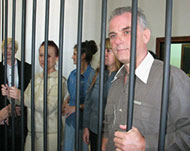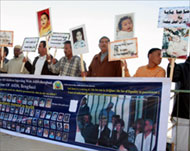Libyan court delays Aids case verdict
The Libyan Supreme Court has postponed for 10 weeks its ruling on the appeal of five Bulgarian nurses and a Palestinian doctor who were condemned to death for infecting more than 400 children with the Aids virus.

Bulgaria expressed deep concern. Foreign Ministry spokesman Dimitar Tsantchev said the repeated delays in the case had tested the limits of the accused, who were first arrested in February 1999.
After Tuesday’s postponement, more than 100 relatives of the infected children clashed with riot police outside the court, hurling stones and bottles.
According to Aljazeera’s correspondent in Tripoli, the clash was sparked by a police officer who pushed a female protester as she was trying to enter the building to the court.
Wielding sticks, the police charged the relatives and dispersed them.
Three demonstrators were arrested, and at least one police officer was lightly wounded in the clash.
Deaths
 |
|
The trial of the accused ended |
The relatives had held banners and placards outside the court calling for the death sentences to be carried out.
Many parents held photographs of the 426 children infected at the al-Fath Children’s Hospital in Benghazi.
At least 50 of the children have reportedly died, heightening the pressure on Libya’s government to punish the culprits.
But the defence has argued that HIV, the virus that leads to the fatal Aids disease, was circulating because of the hospital’s poor standards of hygiene.
Trial criticised
The European Union and the US have criticised the trial, which ended in May 2004, saying it did not meet international standards of due process.
 |
|
Rights groups say the accused in |
Amnesty International and Human Rights Watch have produced reports in which the accused detailed the torture they allegedly endured to make them confess to infecting the children by injection.
In a session lasting fewer than five minutes on Tuesday, Judge Ali al-Allout said the hearing was adjourned to 31 January.
The accused were not present, but they were represented
by their lawyers.
Several European diplomats attended the session.
Afterwards, some were attacked by relatives in the clash outside, and fled back into the building. A diplomatic car was hit by a stone.
Bulgaria concerned
In Sofia, Bulgarian Foreign Ministry spokesman Dimitar Tsantchev said his government would press ahead to procure a favourable resolution of the case.
“We are deeply concerned about the protracted process which has put our compatriots on the ropes of their physical and mental stability,” the spokesman said.
 |
|
Protesting relatives held photos |
The defendants are incarcerated at Jadida prison, 20km east of Tripoli.
While the Palestinian doctor is kept in the male section of the prison, a special house with a small garden has been erected for the five Bulgarian nurses.
The authorities allowed The Associated Press correspondent to inspect the house last month on condition that he did not interview the nurses. It has two bedrooms, satellite TV, and a kitchen with gas cooker and microwave oven.
European Commission President Jose Manuel Barroso has said relations with Libya hinge on the fate of the Bulgarian nurses.
And last month, US President George Bush warned: “There should be no confusion in the Libyan government’s mind that those nurses ought to be not only spared … but out of prison.”
Compensation call
Bulgaria has rejected a suggestion by Libyan officials that the nurses could be spared the death penalty if the Bulgarian government paid compensation to the families of the Aids victims.
“The confession was like multiple choice, and when I gave a wrong answer, they shocked me” Ashraf Ahmad Juma |
During the trial last year, French Professor Luc Montagnier – the co-discoverer of HIV – testified that the virus was active in the hospital before the Bulgarian nurses began their contracts there.
But Libyan medical experts claimed the patients contracted HIV by injection.
In a report released on Tuesday, the New York-based Human Rights Watch quoted the Palestinian doctor, Ashraf Ahmad Juma, as saying he was tortured by electric shock, beating and sleep deprivation.
“The confession was like multiple choice, and when I gave a wrong answer, they shocked me,” HRW reported Juma as saying in the presence of a prison guard.
The London-based Amnesty International reported that two of the nurses said they had been raped.